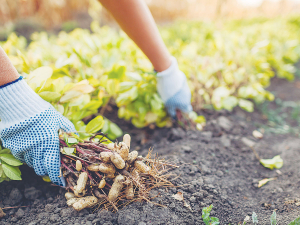Editorial: Happy days
OPINION: The year has started positively for New Zealand dairy farmers and things are likely to get better.
 MPI believes establishing a peanut industry in Northland would help diversify its regional economy and create employment.
MPI believes establishing a peanut industry in Northland would help diversify its regional economy and create employment.
That old saying about peanuts and monkeys may be turned on its head in Northland, where a government-backed project has proven that the crop can be grown successfully in the region.
An initial feasibility study claimed that the industry could be worth millions to the region, with New Zealand companies importing tonnes of peanuts every year.
Now, additional government funding aims to take the project towards the possible commercialistion of growing peanuts in the north.
MPI is contributing nearly $700,000 to a new peanut growing trial via its Sustainable Food and Fibre Futures fund (SFF Futures). Meanwhile, an additional $300,000 in cash and in-kind support is coming from Northland Inc, Picot Productions, Landcare Research, Plant & Food Research and local Northland landowners.
"The findings of a six month feasibility study supported through SFF Futures late last year were encouraging," says Steve Penno, MPI director of investment programmes. "This new project will build upon the initial findings to determine whether its financially viable to plant, harvet, and process peanuts at scale."
Northland Inc is taking the lead in the new project, which will run for 2 years.
"The peanuts will be grown at seven sites in Northland, across both the Kaipara and Far North districts, during the two-year life of the project," says Vaughan Cooper, general manager Investment & Infrastructure at Northland Inc.
"We hope for another successful outcome that will provide conclusive evidence that peanuts can be grown and harvested on a larger scale. This will give investors and Northland landowners, growers and farmers the confidence they need to diversify into peanut growing."
Cooper says while it's clear that returns are possible from peanuts, they also need to factor in the commercial equipment required for harvesting and drying.
"We'll be doing extensive economic modelling to determine whether the costs are worthwhile when producing peanuts at scale."
Penno says establishing a peanut industry in Northland would help diversify its regional economy, create employment both on-and-off farm, and support investment opportunities.
"It will also provide another crop rotation option for local landowners," he says. "Plus, we could eventually bring a 100% New Zealand grown and manufactured peanut butter to market. That's an exciting prospect."
Could a breakthrough in fermentation create a new multi-million-dollar export market for shiitake mushroom extracts into China?
Meadow Fresh has created the world's first fantasy sports league powered by real cows.
This year, 'Foodie February' sees potatoes take the spotlight as one of New Zealand's most powerful and versatile food heroes.
A multi-cultural team is helping to establish one of New Zealand's largest plantings of premium eating grapes - while learning each other's languages and cultures along the way.
The World Wide Sires National All Day Breeds Best Youth Camp Best All Rounder plaudit has become family affair, with 2026 Paramount Cup winner Holly Williams following in her sister Zara's footsteps.
DairyNZ is giving New Zealand farmers a unique opportunity to gain hands-on governance and leadership experience within the dairy sector.

OPINION: Meanwhile, red blooded Northland politician Matua Shane Jones has provided one of the most telling quotes of the year…
OPINION: This old mutt has been around for a few years now and it seems these ‘once in 100-year’ weather…